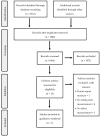Affect, Body, and Eating Habits in Children: A Systematic Review
- PMID: 37571280
- PMCID: PMC10420931
- DOI: 10.3390/nu15153343
Affect, Body, and Eating Habits in Children: A Systematic Review
Abstract
The present review investigates the complex associations between children's affective states, body perceptions, and eating habits, thus providing crucial insights for potential health interventions. Following PRISMA guidelines, three databases were searched for peer-reviewed studies exploring the relationship between eating habits, emotional states, and body image perceptions in a population of children (5 to 11 years old). A total of seven articles were included. Our findings revealed a pattern of associations between negative emotional states, like anxiety and depressive feelings, and maladaptive eating behaviors. Additionally, explicit influences from parental feeding practices, peer pressure, socioeconomic factors, and children's body perceptions were observed to shape eating habits, with a pronounced tendency among older girls towards dieting and food preoccupation. Our results underline the intertwining nature of age, gender, and emotional states. Furthermore, our findings accentuate the urgency for comprehensive interventions that acknowledge and address the complex interplay of emotional, familial, and socioeconomic factors alongside children's body image perceptions. The criticality of continued research, particularly ones employing longitudinal designs and diverse demographic samples, is highlighted as we strive to understand and navigate such multifaceted relationships to enhance children's health and well-being.
Keywords: affect; body; children; eating habits; emotions.
Conflict of interest statement
The authors declare no conflict of interest.
References
-
- Davison J., Bunting B., Connolly P., Lloyd K., Dunne L., Stewart-Knox B. Less Screen Time, More Frequent Fruit and Vegetable Intake and Physical Activity Are Associated with Greater Mental Wellbeing in Adolescents. Child Indic. Res. 2022;15:1339–1361. doi: 10.1007/s12187-022-09924-6. - DOI
-
- Mikkilä V., Räsänen L., Raitakari O.T., Pietinen P., Viikari J. Longitudinal Changes in Diet from Childhood into Adulthood with Respect to Risk of Cardiovascular Diseases: The Cardiovascular Risk in Young Finns Study. Eur. J. Clin. Nutr. 2004;58:1038–1045. doi: 10.1038/sj.ejcn.1601929. - DOI - PubMed
-
- Bastida L., Cea G., Moya A., Gallego A., Gaeta E., Sillaurren S., Barbosa P., Souto S., Rodrigues E., Torrego-Ellacuría M., et al. Promoting Obesity Prevention and Healthy Habits in Childhood: The OCARIoT Experience. IEEE J. Transl. Eng. Health Med. 2023;11:261–270. doi: 10.1109/JTEHM.2023.3261899. - DOI - PMC - PubMed
Publication types
MeSH terms
LinkOut - more resources
Full Text Sources


